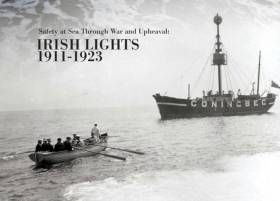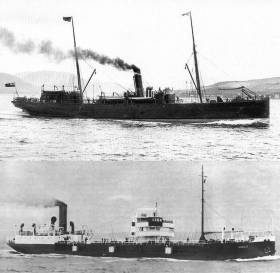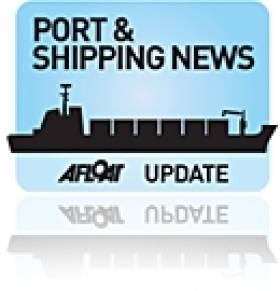Displaying items by tag: SS Hare
‘Safety at Sea Through War and Upheaval’ is the title of an exhibition now running at the dlr Lexicon in Dun Laoghaire, highlighting the history of Ireland’s lighthouses between the years 1911 and 1923.
Using resources from the Irish Lights archive, the exhibition – which runs till 7 January — next year explores the mission of safe navigation at sea in the context of the wider political and economic changes in Ireland at the time: independence, civil war, electrification and more.
A deeper focus on the years of the Great War is afforded by a new exhibition on the SS Hare and SS Adela in Dublin Port, which comes to dlr Lexicon this Monday (8 October) and tells the story of both ill-fated vessels during the rise of the U-boat threat from 1914 to 1918.
Keeping with the maritime theme, the late Des Branigan is the subject of a new display (opened yesterday, Friday 5 October) of archive material from photographs to books that give a rounded picture of a humble, ordinary seaman who achieved extraordinary things.
All exhibitions are open free to the public during library opening hours.
Centenary Ceremony to Mark Loss of Two Irish Sea Cargoship Steamers And Crews During WW1
#WWIcargoshipsCeremony - To mark the centenary of the sinking of two merchant cargo steamships in the Irish Sea and loss of life, an unveiling of plaques are to take place this Saturday in Dublin, writes Jehan Ashmore.
Family descendents of all 36 victims will be joined by community groups, the Lord Mayor of Dublin and the public to commemorate the separate incidents caused by German submarines.
The first cargoship to be struck by torpedo was S.S. Hare on 14 December, 1917, when on passage from Manchester to Dublin. The ship some seven miles east of the Kish Lighship, was attacked by submarine U-62 with the loss of 12 lives.
It was during the '1913 Lockout' that S.S. Hare became famously involved in delivering a cargo of relief food Liverpool to the starving strikers in Dublin. This historic event was also marked with a centenary commemoration by SIPTU and other Irish and UK trade unions with a re-enactment voyage as previously reported on Afloat.ie. This saw the charter of Ben Maye take on the role of 'S.S. Hare' having sailed the same route to deliver a symbolic cargo.
As for the other cargoship casualty, SS Adela was attacked by enemy action while on passage to Liverpool with a cargo of ivestock and coal. It was some 12 miles northwest of the Skerries off Anglesea, Wales that U-Boat 100 torpedoed the ship and taking with her 24 lives.
The majority of those on board who died were civilian seamen or cattle workers and it is understood that from both sinkings, only four bodies were recovered.
Most of the seafarers who died came from the close knit dockland communities, with the ships berthing along the inner city quays among them Sir John Rogersons Quay, part of what is now called the 'Docklands' quarter. It is here that the centenary commemoration will aptly take place at Sean O’Casey Bridge (Custom House Quay) at 1pm. The two plaques are to be unveiled there close to where both ships berthed before making 100 years their final voyages.
For relatives of both tradgedies, Dublin Port Company are to provide a vessel to sail into the bay to conduct a short ceremony and wreath laying service at sea.
Organising the events are the Adela-Hare Centenary Commemoration Committee which was established by the victim's relatives. Following Saturday's plaque unveilings, a reception is to be held along with a public exhibition and launch of a commemorative booklet.
Further events are planned up to December with the Committee given support from Dublin City Councils Commemorations Fund.
For more updated information on the commemoration visit the Committee's Facebook page here.
#Lockout1913 – S.S. Hare the ship that carried vital cargo food supplies from the British TUC to support 25,000 striking workers and their families during the 1913 Lockout was re-enacted yesterday, writes Jehan Ashmore.
Hundreds of people lined Sir John Rogersons Quay in Dublin's 'Docklands' where at berth No. 4 the small short-sea cargoship Ben Maye (1979/548grt) berthed alongside the last remaining campshire ware-houses.
To mark the unique commemorative voyage from Liverpool to the Liffey, the chartered cargoship coaster Ben Maye as previously reported is operated by the Ramsey Steamship Company. Coincidentally the Isle of Man based shipping company was founded a century in the same year of the so called Lockout.
Ben Maye was 'dressed overall' and her bows drapped with banners displaying her temporary renaming in the role of S.S. Hare. After the eventful year of 1913, she was sunk during WW1 by a U-Boat off the Kish Bank in 1917.
As the Ben Maye entered firstly through the East-Link toll lift bridge she was given an escort led by East coast rowing skiff's, Dublin Port Company tug sisters Shackleton and Burford and Dublin Bay Cruises excursion vessel St. Bridget. Following that she made the short distance upriver after passing the opened Samuel Becket swing-bridge.
Senior trade union official made speeches at the quayside and the organisers gratefully acknowledge the support received for the SS Hare re-enactment from the Irish Congress of Trade Unions, SIPTU, Unite, Dublin Council of Trade Union, Dublin Port Company. Also providing assistance was the RMT, the UK's largest specialist transport union and the International Transport Workers' Federation (ITF).
































































